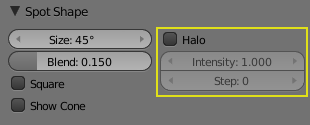Spot Volumetric Effects¶
Spot lights also can produce “volumetric” effects. See Volumetric Light for more information about what it means.
- Halo
- The Halo button allows a Spot lamp to have a volumetric effect applied to it. This button must be active if the volumetric effect is to be visible. Note that if you are using buffered shadows, you have extra options described in the Spot Buffered Shadows page.
- Intensity
- The Intensity slider controls how intense/dense the volumetric effect is that is generated from the light source. The lower the value of the Intensity slider, the less visible the volumetric effect is, while higher Intensity values give a much more noticeable and dense volumetric effect.
- Step
- This field can have a value between (0 to 12). It is used to determine whether this Spot will cast volumetric shadows, and what quality those volumetric shadows will have. If Step is set to a value of 0, then no volumetric shadow will be generated. Unlike most other controls, as the Step value increases, the quality of volumetric shadows decreases (but take less time to render), and vice versa.
Tip
Step values
A value of 8 for Halo Step is usually a good compromise between speed and accuracy.
Blender only simulates volumetric lighting in Spot lamps when using its internal renderer. This can lead to some strange results for certain combinations of settings for the light’s Energy and the halo’s Intensity. For example, having a Spot light with null or very low light Energy settings but a very high halo Intensity setting can result in a dark/black halo, which would not happen in the real world. Just be aware of this possibility when using halos with the internal renderer.
Note
The halo effect can be greatly enhanced when using buffered shadows: when the halo’s Step is not null, they can create “volumetric shadows”. See the page about Spot Buffered Shadows for more information.
See also
